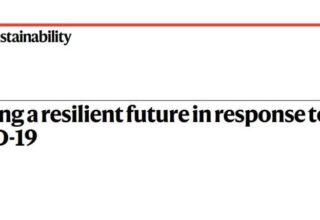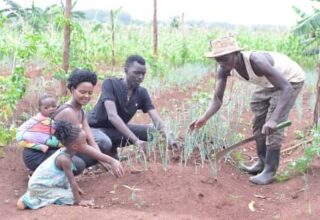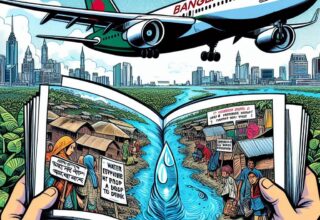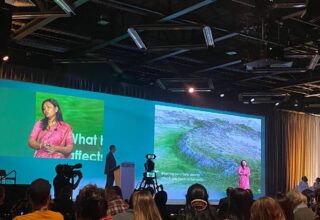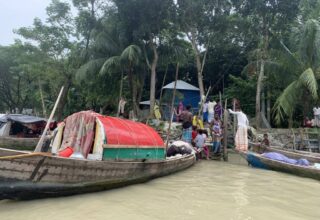This blog talks about how unprecedented impacts of COVID-19 have given rise to inequalities among grassroot communities that are responding against the pandemic and fighting the battle on their own. It also highlights on how to create a now normal collectively without leaving anyone behind by taking into account the reflection points from the webinar on “Inequality in the face of COVID-19: How grassroots organizations are taking actions”.The webinar is second of a series of 4 online events hosted by IIED and the International Centre for Climate Change and Development (ICCCAD) on the climate crisis and COVID-19 which will be hosted between June and October 2020. The webinar was also part of over 70+ online events at London Climate Action week 2020 (LCAW 2020) that took place from July 1st-3rd,2020.
As the COVID-19 pandemic spread to communities across the globe, the containment measures taken to curb the impacts by governments have directly and indirectly been socially and economically devastating. Initially branded as an equalizer for immediate heath impacts, the pandemic has soon proved to bring in stark social and economic inequalities to the most vulnerable. People particularly in developing countries, living in informal settlements and relying on the informal economy; migrant workers; small scale producers; those without savings and with little recourse to insurance or alternative sources of income; and landless tenants have been found to be the worst suffers. These vulnerable groups are least able to adhere to containment restrictions and often lack the means to cushion the social and economic shock.
Those living in informal settlements and poorer households have been particularly vulnerable to the health impacts due to the difficulties of maintaining distancing and hygiene, and lack of health services. The precarious existence of these people doesn’t provide the luxury to work from home, leading to higher exposure to health risks. The informality of the jobs with no proper policies, lack of wealth, savings, voice and power further intensifies the burden of the pandemic on them. Inequality within countries and households is strongly linked to gender. Women face specific inequalities, as well as other marginalized population including people with disabilities, indigenous and ethnic minority groups. Bearing a disproportionate burden of the COVID-19 crisis across several dimensions, women are facing a compounding effect. Thanks to the prevailing social norms noticed more vividly in informal settlements, women are expected to bear the brunt of the increased burden of care of the sick, the elderly and school-aged children. Increased caregiving opportunities coupled with economic crisis have resulted in intensified physical and mental distress; with increased rates of domestic violence and teenage pregnancy being witnessed.
Fragile existing system to address the inequality
The systemic crisis in the form of COVID-19 has forced us to confront all the ways the existing system and development gains have failed. The pandemic and consequent lockdown has led to the disruption of livelihoods, fall in productions, pay cuts and overall economic shut down devastating almost all the sectors. According to the International Labour Organization (ILO), there are total 2 billion informal workers around the world which accounts for 61% of all the workers globally. Among them, 1.6 billion workers have been impacted by lockdown measures. So the inequalities between the top and the bottom of the economic pyramid have been further exacerbated by the pandemic. Even during the ‘old normal’, the system didn’t treat the informal workers any better. They have always been accused of low productivity, offered with low payments, and had no social protection coverage despite being the frontline workers. Within the hostile legal and policy environment, they have been trying to secure a niche. Failure in accessing government reliefs, increases in cases of crimes, insecurities and social unrest depict the non-functionality of the system. Now that the pandemic has hit the system, we are beginning to see all the fault lines. If the system keeps on working the same way, the world will confront even worse days going forward.
Looking ahead- responses of grassroots communities and organizations
As much as the pandemic is revealing the harsh realities and existing gaps between the have and the have-nots, it is also showcasing that the grassroots communities are also very much drivers of resilience, not just victims only. When global organizations struggled to deal with the challenges, these people produced alternatives, dealt with challenges and coped with difficulties. Having experiences of evictions, negligence and poor access to services, these marginal communities have depicted the society on how to rise out of the crisis. During this unprecedented crisis, local communities and their networks that are in the frontline are self-organizing to combat the spread of the virus and support the most vulnerable within their communities. Such spontaneous, self-organizing community resilience is proving to be a crucial element in navigating this exceptional disruption. They are also scaling up their work through peer exchange and mentoring process. There are numerous examples of such responses across the world where these communities have organized and distributed reliefs to the most vulnerable, helped others to access authentic information, created community kitchens, organized makeshift markets to sell their produce and so on. All of these have been possible because of their past experiences of resilience building. Strong determination on developing trusted networks, commitment to improving the communities to have access to resources- savings, funds etc. and thinking above any project period have greatly helped them coming this far. Organizations dealing with grassroots have also helped strongly in the process by creating and regularly updating real-time data, advocating for these communities and above all, giving them the voice and power.
While the networks and federations of the grassroots communities and organizations have been proved to be successful in dealing with the crisis, it is getting increasingly difficult for them to maintain relations with the newly imposed notion of online meetings. We the privileged ones are constantly meeting online and doing business. While the grassroots organizations which also intends to be part of these global discussions are not being able to do so based on social, economic and geographical barriers. This again leads to the exclusion of voices of the vulnerable who can’t access and afford ICT services.
COVID-19, climate and the collaboration we need to reduce inequality
Rising inequality is not inevitable; national institutions, politics, policy, and civil society can play key roles in both addressing existing inequalities and in reaching a more equitable response to the immediate and long-term impacts of the COVID-19 pandemic. It is also imperative to look beyond COVID-19 and envision changes focusing on forward-looking responses to create a resilient just society and better new normal in the face of future crises such as climate change.
The current flawed economic system prioritizing capital over the labor needs to be reformed to bring in positive changes. This requires the reframing of the rules of the economics by including organization of the poor, grassroots in the reforming process. This fundamental reset should be in such a way that it recognizes the contributions, capabilities, and agency of the grassroots and essential support providers. This transformation should be led by the communities, across a scale and using intersectionality lens.
Built on the experiences of COVID-19 and other disasters, it has been observed that, organized communities which know how to source information, form networks, seek help and demand accountability are more likely to bring in positive changes in their communities as opposed to the ones who are not organized and mere passive recipients of assistance. Therefore, investments should be driven to produce social capital and long term sustainable networks of the disenfranchised. Moreover, proper entitlements should be vested upon them to bring about transformative changes. Apart from self-empowerment, the grassroots communities would also require allies to get political strength. So researchers, practitioners, academics, and people from all relevant fields of practices should engage, challenge the dominant models and change the paradigm.
While the pandemic keeps on posing gruesome effects on the communities, other crises have continued to happen including climate impacts in the form of cyclones, floods etc. So multi-dimensional risk management becomes an area of major concern. As most of the risks are interlinked, holistic multidimensional risk management approaches should be taken keeping long term resilience building and climate action into the forefront, rather than working on silos and focusing only on the pandemic.
To make sure we are not heading towards an even worse normal, more and more investment in resilience building is needed using tested models. The successful cases of the community-led multiple risks management models and informal governance systems should be looked at. Though most of these community-led initiatives also work in silos, if we can build a system to connect the community structures and capacitate them with proper information and skills, this will have a solid contribution in creating long term resilience.
There is also a growing concern that with all hands joined to fight the virus, most of the resources might be diverted to the pandemic while climate change continues to take place. To make sure that doesn’t happen, governments, global donors and private sectors should start investing in green development, nature-based pathways and capacitate the most vulnerable to become the agents of change. Histories have shown that, when an emergency is over, people get so busy in dealing with the economy without thinking about the inequalities and environment that the system eventually falls back into a worse position. Therefore, to fight this battle more smartly and strategically, all parties need to join forces and work together to find solutions and deal with it as a planetary challenge rather than a local one.
Please note the ideas presented in this blog aim to inspire and inform how the grassroots organizations are taking action– they are the views of the author and do not necessarily reflect those of the Speakers Panellist present at the IIED and ICCCAD joint webinar on “Inequality in the face of COVID-19: How grassroots organizations are taking actions”.
About the Author
Shahrin Mannan is a Senior Research Officer at ICCCAD.

